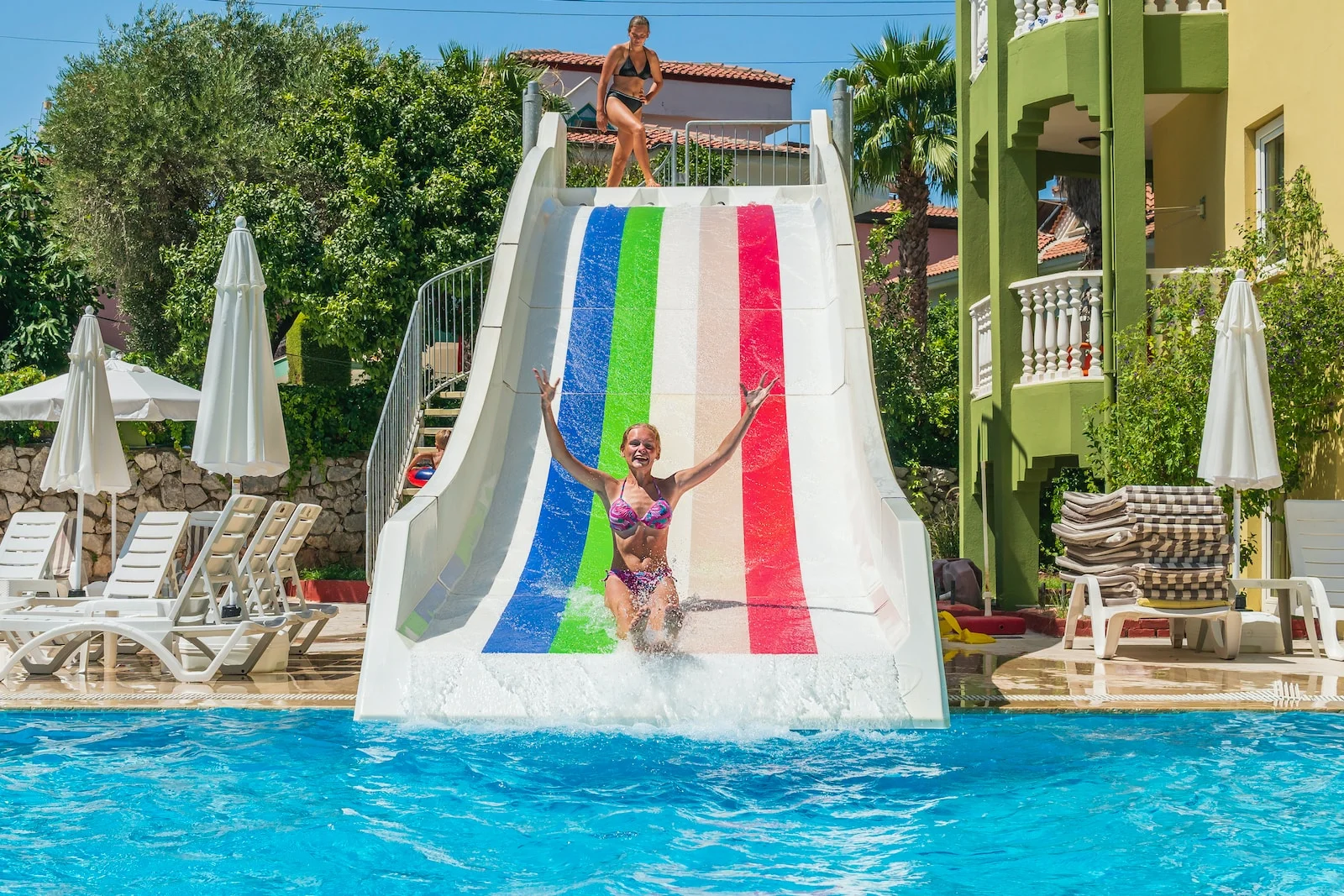UPDATED: JULY 18, 2023 | 3 MIN READ

Swimming pools can be a great addition to your home, but they’re also a liability. That’s why it’s important to understand the exclusions and limitations of homeowners insurance regarding swimming pools.
Common exclusions or limitations
Homeowners insurance policies typically exclude or limit coverage for the following items related to swimming pools:
- Damage caused by some natural disasters: Homeowners insurance doesn’t cover damage to your swimming pool caused by natural disasters like earthquakes, floods, or hurricanes.
- Wear and tear, lack of maintenance, and failure to winterize: If your swimming pool is damaged due to wear and tear, lack of maintenance, or failure to winterize, your homeowners insurance won’t cover the cost of repairs.
- Pool slides and diving boards: Some homeowners insurance companies may exclude pool slides and diving boards from coverage. This is because these features can increase the risk of accidents.
Understanding coverage gaps and potential risks
The exclusions and limitations above can leave you significant financial exposure if something happens to your swimming pool. For example, if an uncovered natural disaster damages your swimming pool, you may be responsible for the entire cost of repairs. Or, if a child is injured in your swimming pool, you could be sued for a large amount of money.
There are several homeowners insurance coverage gaps that can arise when it comes to pools, along with potential risks associated with them.
Here are a few to consider:
- Limited or excluded coverage: Common exclusions include damage caused by freezing, wear and tear, or maintenance-related issues.
- Liability risks: Pools pose significant liability risks, especially if someone gets injured on your property. If someone drowns, sustains an injury, or experiences any accidents in or around your pool, you could be held financially responsible for medical expenses, legal fees, and potential lawsuits.
- Increased premiums: The increased risk associated with pools may prompt insurance companies to charge higher rates to account for potential liability claims.
- Safety requirements: Insurance companies may have specific safety requirements for pools to maintain coverage. These requirements could include having a fence or gate around the pool, installing safety covers or alarms, and adhering to local building codes.
- Maintenance responsibilities: Insurance coverage may be denied if negligence or lack of maintenance contributes to pool-related issues, such as leaks or equipment failures.
Additional tips
In addition to getting the right insurance coverage, there are a few other things you can do to reduce your risk of liability claims:
- Keep your pool clean and well-maintained. This helps to reduce the risk of claims.
- Install a fence around your pool. This will help to keep children out.
- Keep your pool covered when it isn’t in use. This will help prevent accidents and keep debris out of the pool.
- Teach your children how to swim safely. This will help reduce the risk of drowning.
- Have a first-aid kit on hand. This will be helpful in case of an accident.
FAQs
What are some of the exclusions for homeowners insurance regarding swimming pools?
Homeowners insurance typically doesn’t cover damage to swimming pools caused by earthquakes, floods, or hurricanes. It also doesn’t cover damage caused by wear and tear, lack of maintenance, or failure to winterize.
In addition, some homeowners insurance companies may exclude pool slides and diving boards from coverage, as these features can increase the risk of accidents. Finally, homeowners insurance doesn’t cover damage to swimming pools caused by intentional acts.
What are some of the limitations of homeowners insurance regarding swimming pools?
Homeowners insurance typically limits the coverage for swimming pools to a percentage of the dwelling coverage. Other structures and personal property have coverage limits of 50% of the dwelling coverage.
The liability coverage on a standard homeowners policy has limits of $100,000, $300,000, or $500,000. This covers liability for swimming pool accidents. If you need more coverage, consider an umbrella policy.
Does homeowners insurance cover pool damage from ice?
No, homeowner policies generally don’t provide protection for damages resulting from frozen water in your pool. Thus, it is advisable to take precautions by draining the pool at the conclusion of each season.
Is a pool an “other structure” in insurance?
“Other structures” coverage on a homeowners insurance policy typically covers detached structures on your property, such as:
- Fences
- Detached garages
- In-ground swimming pools
These structures typically cover the same perils as your home, such as fire, hail, wind, and vandalism. However, the amount of coverage available for “other structures” has a limit to a percentage of your dwelling coverage.
Is a pool a detached structure?
Almost any physical structure on your property that’s not an attachment to your primary house is an “other structure.” Common “other structures” examples include in-ground pools, patios, and detached garages.
The term “other structures” can include sheds, gazebos, and mailboxes. The specific structures covered under “other structures” will vary depending on your homeowners insurance policy.
Find homeowners insurance for your pool
Homeowners insurance can provide valuable coverage for your swimming pool, but it’s important to understand the exclusions and limitations of your policy. Adding the appropriate endorsements or riders can help fill the coverage gaps and protect you from financial loss in an accident.
To find affordable coverage, fill out our online rate form. You can review quotes from the top companies in your area.
Related content:
- How Much Does Pool Insurance Cost Per Month?
- Does Home Insurance Cover Pool Leaks?
- Is a Pool Covered Under Homeowner’s Insurance?
- What is Other Structure Coverage or Coverage
- Swimming Pool Safety Equipment Impacts on Insurance
- Pool Damage and Insurance Claims
- Insurance Discounts for Pool Owners